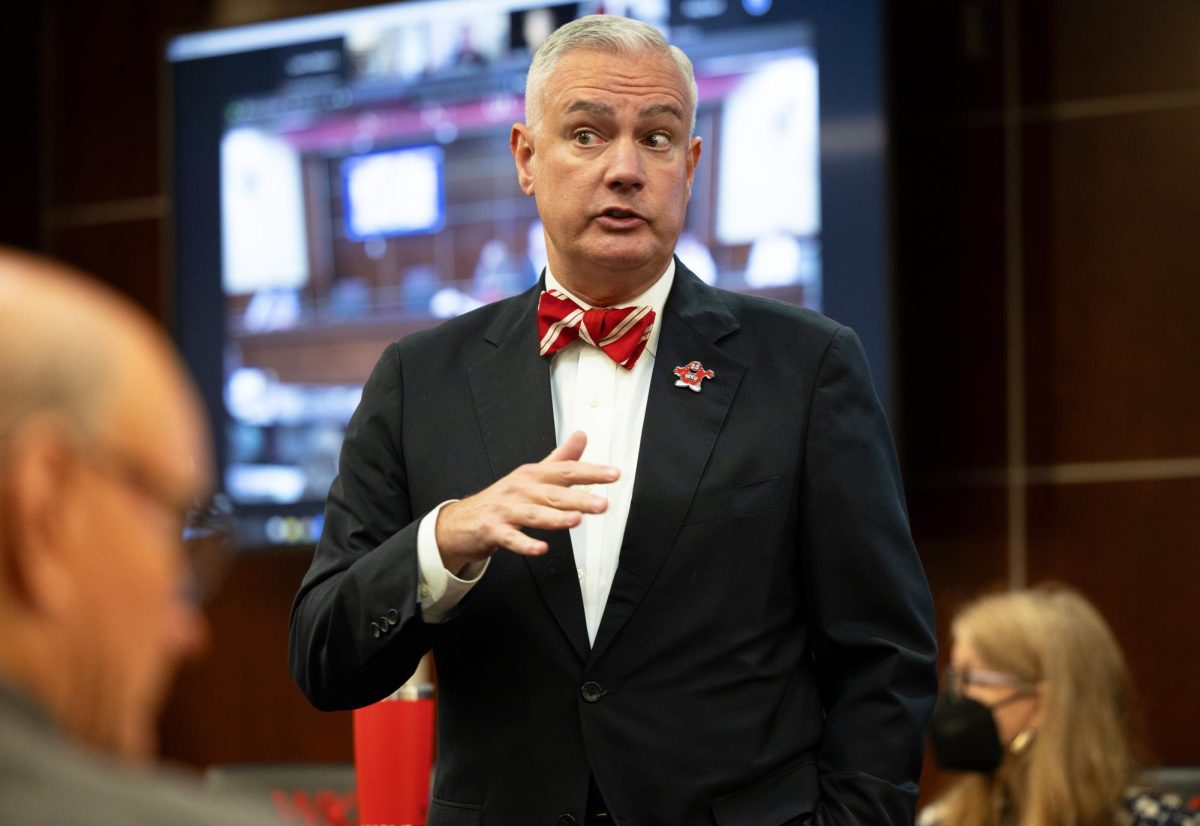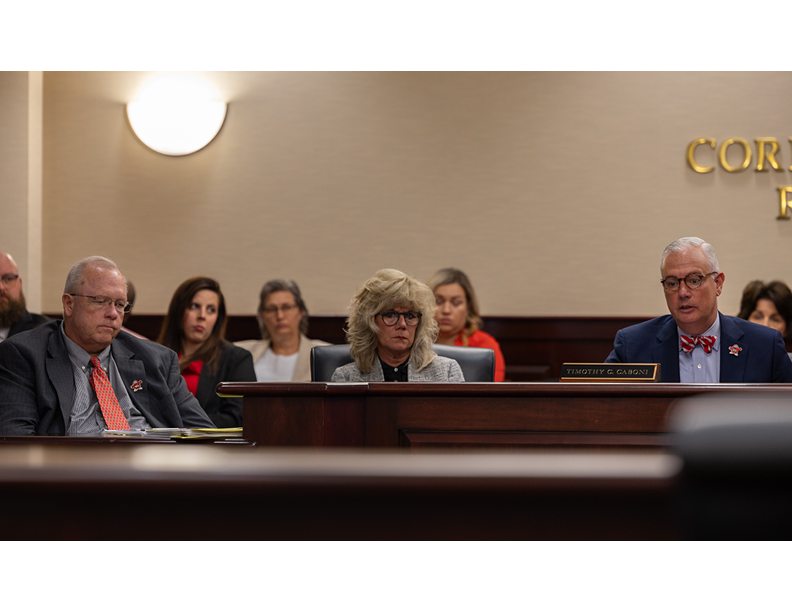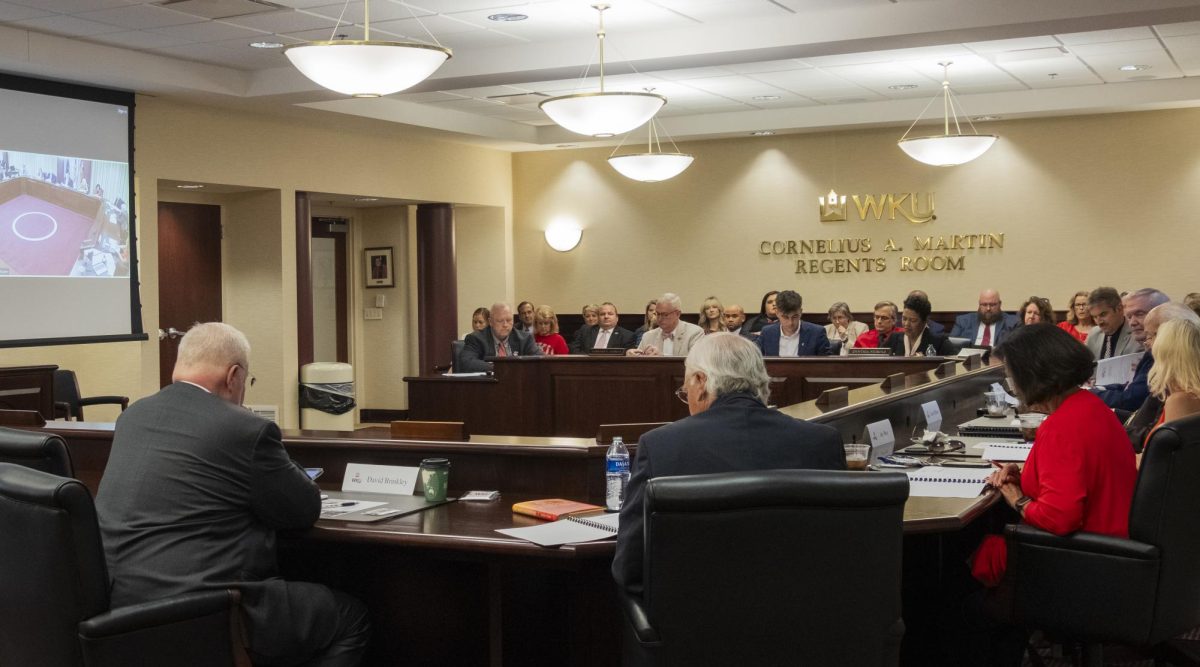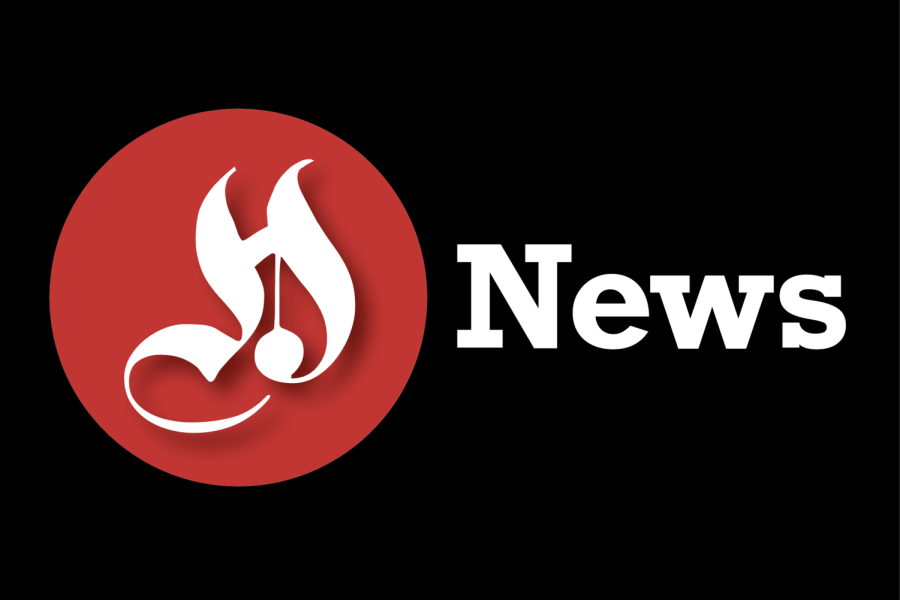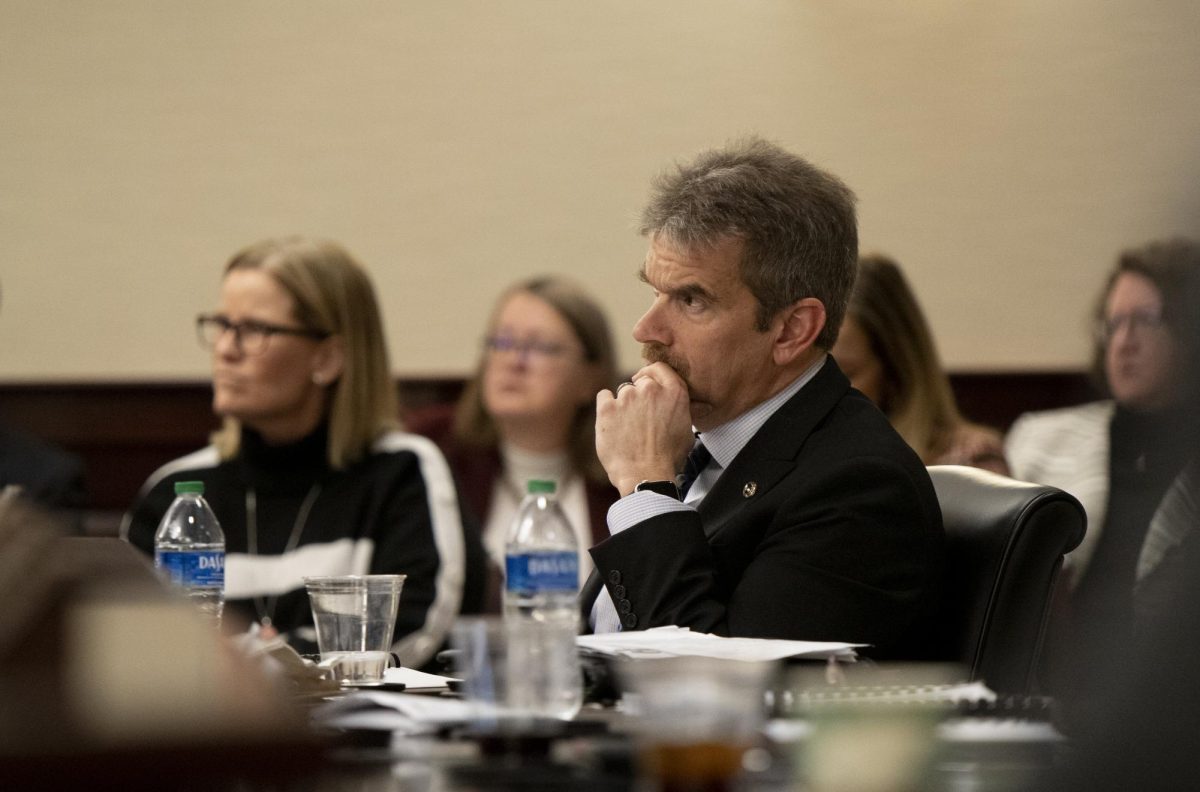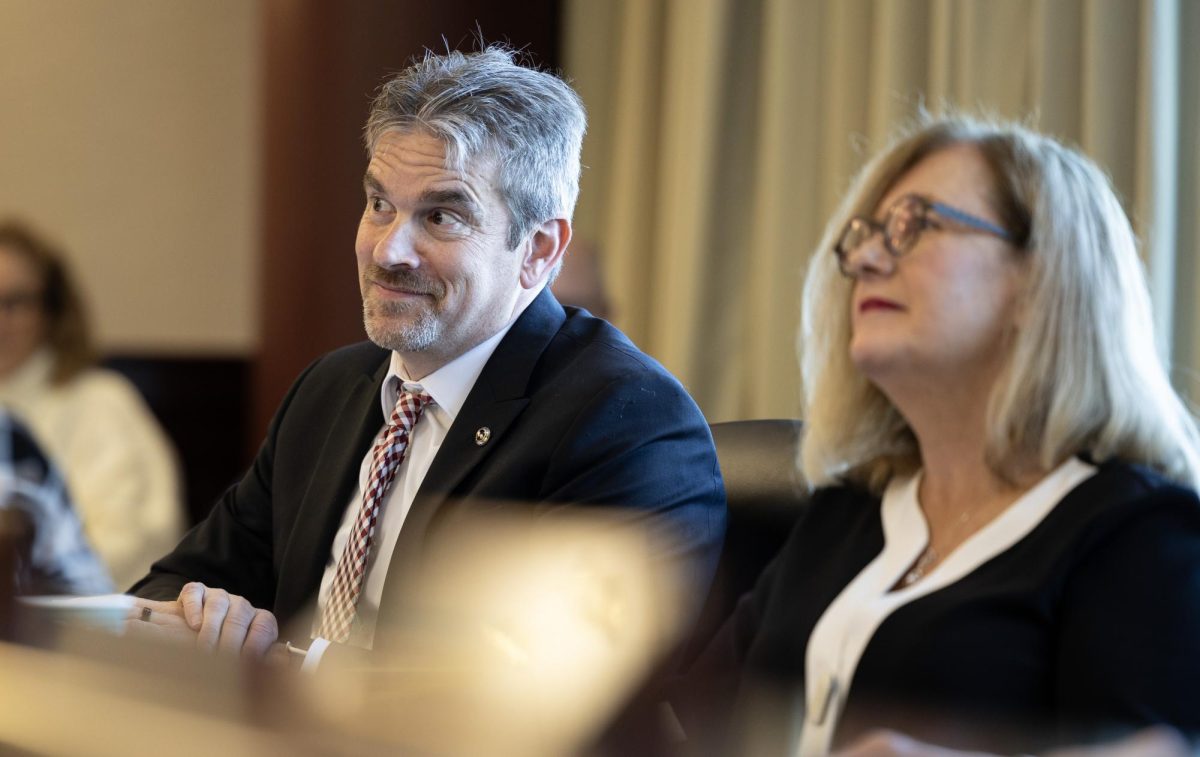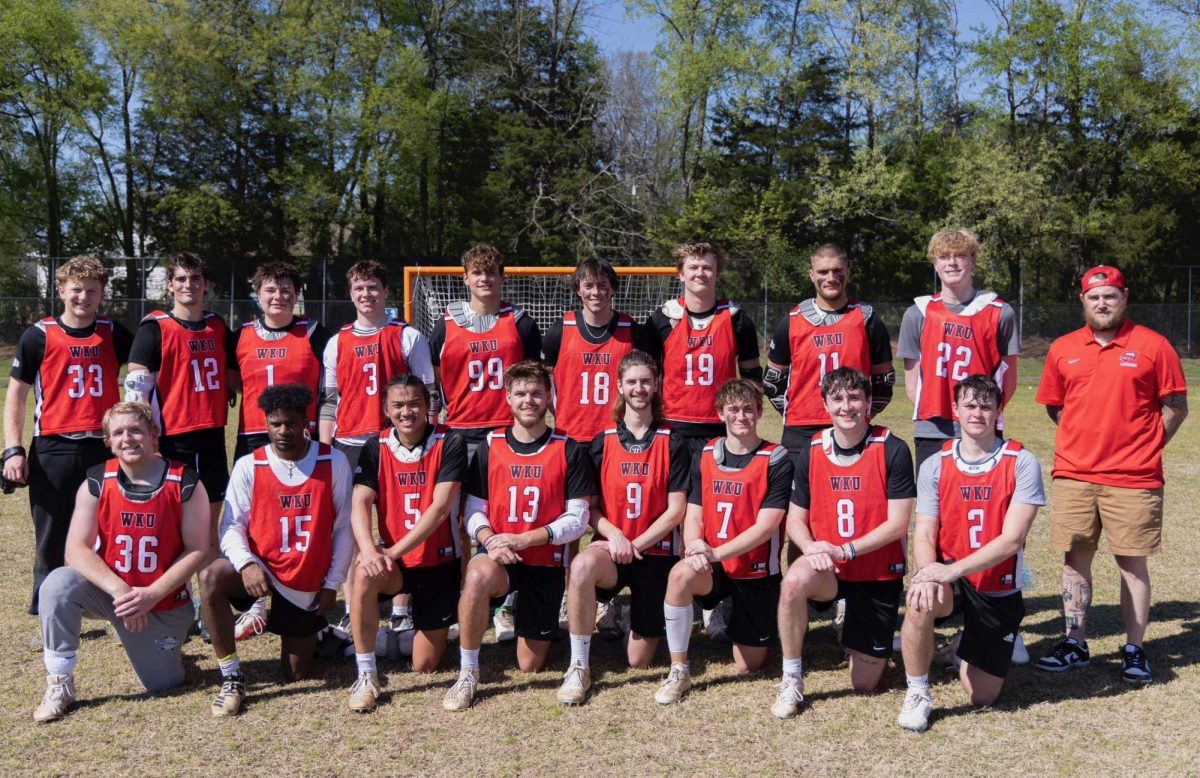WKU President Timothy Caboni appeared before the Faculty Senate on Thursday at their monthly meeting to answer questions primarily about the university budget and faculty compensation.
This is Caboni’s first time formally appearing before the entire Senate since taking office in 2017, with three previous formal appearances only before the Senate Executive Committee, reported by a Herald article from December 2022. This is also the first in-person Senate meeting to be held since the COVID-19 pandemic, with a majority of members still attending on Zoom.
Senate members were able to submit anonymous questions to Caboni prior to the meeting that totalled to 120. Caboni said he would provide a “set of remarks” to address the broad themes from the questions.
“We [faculty] are good at critiquing. And I’m a personal fan, because I believe that this university has to be a learning organization, we need to get better,” Caboni said. “The way we get better, I think, it’s just being honest with ourselves and talking about the work that we have to do together. And we’ve done some really good work.”
Caboni then discussed enrollment increases, with the first enrollment increase in degree-seeking students seen since 2013, as well as growth in retention.
Budget
A majority of Caboni’s discussion revolved around the university’s $11 million overspend, or 3%, above the actual revenues in fiscal year 2022-2023. He said the university had built in flexibility from years past to “navigate through” the overspend.
The $11 million overspend is the difference between actual revenues and actual expenditures from FY23, according to previous Herald reporting. The actual expenditures, totaling $400.6 million, were $17.2 million over the budgeted expenditures and revenues, both set to be $383.4 million.
“We do not have a budget crisis, okay?” Caboni said. “We have more money this year than we had last year in the actual budget and we are not going to go back to the work we did in 2017- 18. We’re just not going to do that. So what about our what does that mean? It means last year we overspent our budget by 3%. Is that good? No, not good. Because every year before in the five years I’ve been here we’ve underspent our actual budget by almost 10%, between 10 and 8%. What does that mean? It means we’ve been conservative, we’ve been disciplined. And we’ve managed to create flexibility for ourselves so that when we did have the first full year of the budget model … we had the ability to navigate through.”
Caboni attributed portions of the overspend to enrollment and student experience and athletics, primarily occurring in the fourth quarter of the year. He explained that the university will return to a 90% spending plan of the budget, like what has been done in years prior, and that “there is no cut, it’s just being disciplined.”
“Every unit is being asked to spend 90% of actual,” Caboni said. “Why? Because that’s good, conservative budgeting. I’m not asking anyone to cut their budget, their budget is their budget.”
He said that this plan simply ensures flexibility and the creation of carry-forward money, or unexpended balances at the end of a fiscal year.
“An average faculty member and average staff member should not feel anything at all related to that spend, but it’s going to allow us to ensure we have the flexibility and the ability to work forward,” Caboni said.
According to the WKU Carry Forward of End-Year Funds Policy, last revised in January, if the university budget is unbalanced, carry forward funds may be used to balance the budget. At the Board of Regents committee meeting on Friday, Oct. 20, the board is set to approve an $18 million carry forward return to academic units.
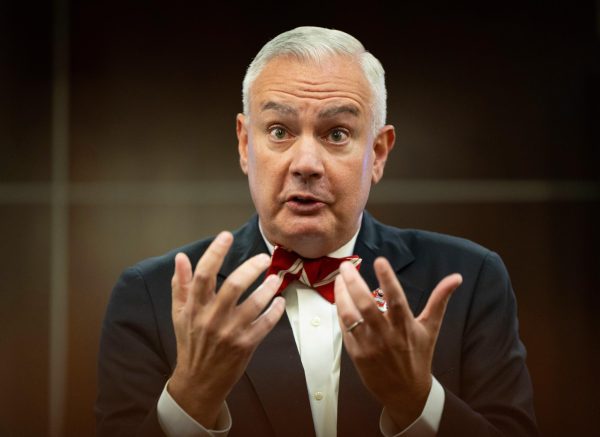
“We managed to return $18 million in carry forward to academic units, even in the midst of this. So there’s not a budget crisis. We’re not in dire circumstances. What we have to do is be mature, prudent, and it gets where we need to,” Caboni said.
The carry forward returns are centralized and will be returned to the deans of each college to be distributed at the deans’ discretion. Caboni said deans have the responsibility of these funds because they are “closer to the action” with faculty and academic programs, and can then decide where those resources should be applied.
“I wanted to devolve control to where it needs to be, which is in the hands of the deans,” Caboni said. “That’s how I see the world. That’s what a responsibility centered budget model is supposed to do. It’s supposed to devolve control and decision making through the deans, instead of everything being the president’s responsibility or decision.”
Caboni said the 90% spending plan is what produces carry forward dollars that can be one time or recurring, which can then be allocated differently.
“Spending 100% of a budget is awful fiscal management, it’s terrible,” Caboni said. “It flies in the face of how you run any organization. And so all we’re asking is that folks are prudent, that deans are prudent, that we spend 90% of actual and let’s see what happens in the spring.”
He explained if there is a unit that is spending more than 90% of actual, then “that’s a problem.” If this happens, Caboni said the unit will be specifically restricted to using the 90% spend amount.
“We’re gonna encumber whatever the total amount is that keeps it in a 90% spend,” Caboni said. “What does that mean? I’m bracketing off the dollars where you can’t spend it. Because you demonstrated to me that you, your budget manager or whoever does not have the capacity to be disciplined. So until you demonstrate discipline, we’re going to not let you do it.”
A question was posed on the Zoom chat asking about the decision to reduce spending within academic affairs to cover overages in other areas. Caboni said that this is not accurate and that the 90% spending plan is for the entire university.
“What we’re asking everyone to do is spend 90%,” Caboni said. “There’s some units in academic affairs that did not spend 90% of actuals as well. We’re asking everyone to have that budget discipline. Academic Affairs, for those who are worried that academic affairs is subsidizing a trip to Hawaii for the football team, not happening. Not happening.”
Caboni said the university can accurately project the budget and potential factors using forecasting tools, but that last year, it was not utilized enough times. This year, the budget forecasting will be done every month.
“So what we’ve done this year is month by month, you’re going through and making sure that spend is actually in line to be at 90% of actual,” Caboni said.
Compensation and academic affairs
The other primary topic of discussion that faculty questions covered was compensation for staff and faculty.
Caboni stated that because of the Budget Executive Committee, he is committed to regular 2% raises every year going forward. He pointed this to reflect inflation as well.
“I will tell you, I know that’s not enough, it isn’t,” Caboni said. “The inflationary pressures that all of us are feeling.”
The 2% salary increases are to represent the 2% tuition raises that the university currently has per year, limited to this because of the CPE board.
In regards to a question referring to a $100,000 raise yearly for the president, Caboni stated that this is not true, and he receives the same 2% raise that all other staff gets.
“And that’s built into my contract as an incentive so that I have incentive to get a raise for you because I also get the raise,” Caboni said.
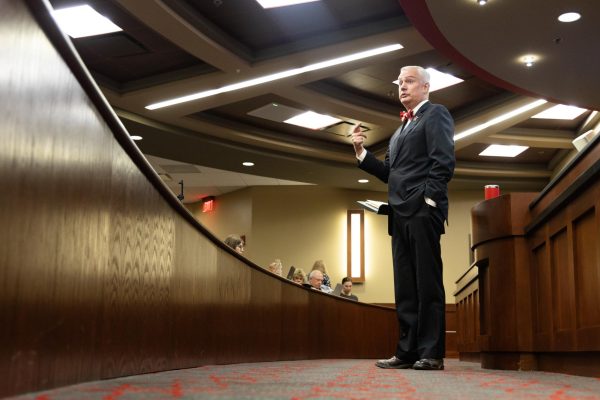
With certain faculty and staff expected to receive significant salary increases, Caboni mentioned how in comparison, the raises for these staff members are 4%, 7%, 10% and 17%, compared to the 2% raise set for all other staff.
“We do the exact same retention offers for average faculty who have other opportunities that we want to retain here,” Caboni said.
Faculty members who joined via Zoom had comments to share through the chat. James Barker, associate professor, said that a $1,000 monthly raise for faculty members would give them an average pay among other universities.
Caboni said that out of 560 of 1500 staff over the past three years were able to get market adjustments by means of reorganizing, changing jobs and responsibilities and “changing the scope.”
“What I don’t want us to do as faculty is say ‘that’s not good’, because it is good,” Caboni said.
“Let folks do what they’re good at, what they want to do, in a way people feel more compensated,” Caboni said. “You all have ultimate authority of our academic programs.”
In comparison to other universities in the vicinity of WKU, Caboni mentioned that WKU has decreased its debt load, and he was “proud of that because we paid off debt.”
Not only was compensation a topic of discussion, but also academic affairs as a whole.
Going forward, looking at programs that need help or can be done better need to be looked at is important, Caboni said, such as the photojournalism program changing to visual journalism and photography.
“We did that work the past six years, that has put us in a pretty strong place,” Caboni said.
Angela Jerome via Zoom chat said that currently, programs do not have enough faculty to expand.
In addition to the in-class experience that Caboni focused on, he also touched on the out of class experience that students get by coming to WKU, and how certain one time expenses add to said experience.
DJ Diesel, who was paid $150,000 to come to campus last year, in addition to bringing Jordan Davis this upcoming Tuesday, Oct. 24 for a pregame concert, were both referred to as “one time dollars” by Caboni.
“Well, number one, because the out of class experience here is just as important as the class experience. It’s a total college experience,” Caboni said.
In justification of large one time purchases, Caboni stated that the university will not spend “one time dollars” on recurring costs, such as new faculty members.
“That’s how you create a hole in our budget, disaster,” Caboni said.
Additional out of class experiences that Caboni noted were the championship cheer team that the university has, division one athletics and FBS football. While these are in place at the university, Caboni made a point to emphasize that money from academics is not being allotted to athletics.
Caboni also mentioned that if faculty are not teaching fully remotely, that they need to be on campus, not teaching through Zoom or other platforms.
“Do you want to be part of this community or not? If not, there are lots of other places where you can teach 100% remotely,” Caboni said.
Caboni emphasized that part of the experience of being in the profession of higher education is “building intellectual communities” and that it cannot be done if individuals are not present on campus.
As much as he respects the flexibility of faculty, Caboni turned to the deans to question why some of their faculty were still fully remote.
Concluding his talk with the senate, Caboni closed by stating that he appreciated “the majority of the questions that [he] received on budget, compensation, and commissions,” but also hopes to see faculty take further authority over academic affairs.
“This is your responsibility,” Caboni said. “You maintain academic quality and you should push and own it.”
Content editor Molly Dobberstein can be reached at [email protected]. Editor-in-Chief Alexandria Anderson can be reached at [email protected]. News reporter Maggie Phelps can be reached at [email protected].
For tips and comments, contact the Herald at [email protected] or at [email protected].
If you would like to submit a Letter to the Editor about this piece, please send it to commentary editor Price Wilborn at [email protected] or [email protected].














